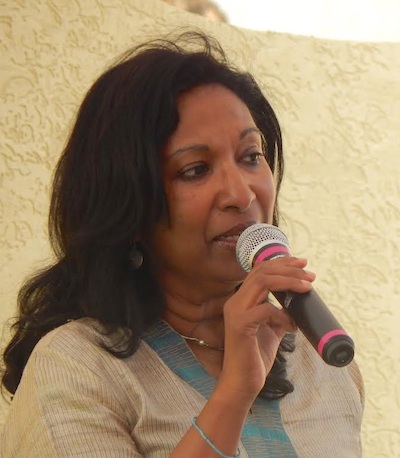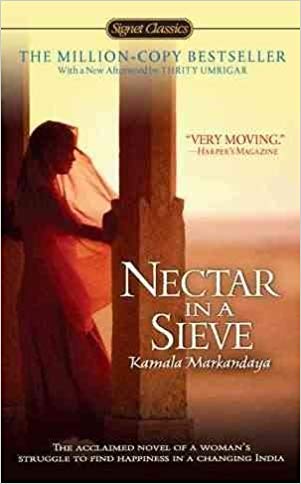Remembering Meena Alexander, Indian Poet and Scholar
By Melanie P. Kumar | On February 20, 2019 | Updated July 6, 2021 | Comments (0)

There are times when you take more interest in a poet or an author after you read her obituary. This is what happened with Meena Alexander, whom I had read in passing but devoured in great detail, especially after I heard that she had succumbed to cancer on November 21, 2018 in New York.
Meena could be termed an international poet as she was of Indian origins, born in Allahabad in 1951 and raised in Kerala, India before the family moved to Sudan.
Meena finally made the U.S. and New York City her home, where she was a professor of English and Women’s Studies at City University of New York and Hunter College.
For five years in between, she also did teaching stints in various universities in India. Meena’s writings clearly reflect her life — migration, the trauma of moving places, and finally reconciliation.
Poetry collections, memoirs, and essays
As I write this tribute, I have Meena’s latest work of poetry Atmospheric Embroidery, in front of me. But she is equally renowned for her other volumes like Illiterate Heart, which won her the 2002 PEN Open Book Award and Raw Silk.
Her autobiographical memoir, Fault Lines, and her volume of poems and essays, The Shock of Arrival: Reflections on Post Colonial Experience, clearly bring out her feelings of angst. In the The Shock of Arrival, Meena wrote:
“The act of writing, it seems to me, makes up a shelter, allows space to what would otherwise be hidden, crossed out, mutilated. Sometimes writing can work toward a reparation, making a sheltering space for the mind. Yet it feeds off ruptures, tears in what might otherwise seem a seamless oppressive fabric.”
. . . . . . . . . .

Meena Alexander at Hyderabad Literary Festival, 2016
. . . . . . . . . .
One can term it a coming-home present to oneself, because interestingly, it was during her five-year stint as a Professor in India that Meena published her first three books of poetry, The Bird’s Bright Ring, I Root My Name, and Without Place.
References to memory come up often in Meena’s writings and she observes, “In the poem, there is always that present moment, which is terribly important through which memory works.”
Besides the PEN award, Meena’s honors include grants and fellowships from the Guggenheim, Rockefeller, and Fulbright Foundations, National Council for Research on Women, and the South Asian Literary Association’s Distinguished Achievement Award in Literature, to name a few.
. . . . . . . . .

You might also enjoy: 10 Classic Indian Women Authors
. . . . . . . . . .
A sampling of poetry
The theme of displacement appears in myriad forms in Meena’s poetry. In the poem, “Udisthanam,” meaning base or foundation from the volume, “Atmospheric Embroidery,” she writes with near Biblical allusions:
Where are those refugees
Amma did not want me to see,
Gunny sacks and torn saris,
Stitched together with cord?
Breath of my breath, bone
Of my bone, dark god
Of the Nilgiris,
Who will grant them passage?
In another poem from the same collection called “Tarawad,” meaning home in her native language, Malayalam, Meena brings out the tragedy of leaving home thus,
Unseen umbilicus
That tethered me
Even as the ocean
Swept on and on.
Going, going, gone!
Someone banged the gavel,
Hearing the house was sold
She lay down in the mango grove
And stopped her eyes with stones,
Crazy girl, inconsolable!
Where is she now?
And the poem ends in sheer lyrical poesy…
What becomes of houses torn down?
In the room where she slept
Milk trickles
Syllables swarm, lacking a script
Door jambs stick to emptiness
Threshold split from walls.
Meena looks through a child’s eyes in a war-ravaged nation, in her Darfur poems, “Last Colours” and “There she stands,” where life and art seem to inspire each other:
In another country, in a tent under a tree,
A child sets paper to rock,
Picks up a crayon, draws a woman with a scarlet face,
Arms outstretched, body flung into blue.
The child draws an armored vehicle, guns sticking out
Purple flames, orange and yellow jabbing,
A bounty of crayons, a hut burst into glory.
How tragic it is for a child to see
On a cloud,
A child, arms splayed.
Beneath her, a field.
Red trees
With creatures clinging on —
Cat, dog, goat, mother, father too.
How are they all going to live?
Meena’s sensitive poetry pierces through these images to look straight into the heart of these children and their dreams and fears, which probably converge with her own childhood experiences of displacement.
But finally, Meena is able to make peace with migration and the acceptance of her many identities when she says in the “Poetics of Dislocation”: “And in terms of identity, surely one could argue versions of such a crisis have been with us for a very long time. There is nothing new in exile. It is as ancient as the notion of home.”
Given that Meena is no more with us physically, she might conclude that there is nothing like a permanent home on earth. Or maybe one can add a disclaimer that a poet or writer does live on, through her work.
Rest in peace, Meena.
Melanie P. Kumar is a Bangalore, India-based independent writer who has always been fascinated with the magic of words. Links to some of her pieces can be found at gonewiththewindwithmelanie.wordpress.com.
. . . . . . . . . .

Meena Alexander page on Amazon*
. . . . . . . . . .
More about Meena Alexander
- Meena Alexander biography on poets.org
- RIP, Meena Alexander
- Meena Alexander’s biography and complete works
*This is an Amazon Affiliate link. If the product is purchased by linking through, Literary Ladies Guide receives a modest commission, which helps maintain our site and helps it to continue growing!
Leave a Reply